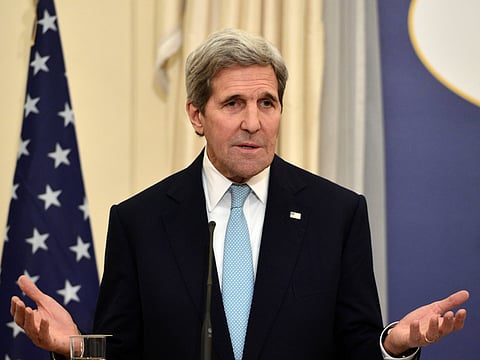Kerry warns of Palestinian authority collapse
Kerry questions Israel’s long-term intentions over its colony expansion

Washington: Secretary of State John F. Kerry warned Israel on Saturday against allowing — or even promoting, as some have urged — the collapse of the Palestinian National Authority, saying that it would leave the Israelis with unbearable financial and strategic costs, and undermine the security of the Jewish state now and in the future.
In a strongly worded speech at the Brookings Institution’s Saban Forum, Kerry asked whether Israelis were “ready to accept the heightened risk [of] chaos, lawlessness and desperation” that would result. Not only would Israel have to take over the provision of all basic services and welfare for the population, Kerry said, but also the end of the current modicum of Palestinian self-rule would cut off international assistance to the West Bank.
“It really goes to the heart of the bigger debate,” he said. “The truth is that many of those arguing against the Palestinian [National] Authority,” a group that he said includes some in the Israeli government, “simply don’t believe in two states.”
Kerry acknowledged frustration at the failure of his own efforts to forge a peaceful solution to the Israeli-Palestinian conflict that would result in separate states guaranteeing mutual recognition and security.
He pledged continued US support, saying of Israeli Prime Minister Benjamin Netanyahu and Palestinian National Authority President Mahmoud Abbas, “I don’t think it’s just exclusively up to them.”
“But it’s mostly up to them,” Kerry said.
Clashes that began in early fall after an increase in Jewish colonist raids on the Muslim holy site Al Haram Al Sharif. Under a status-quo agreement, Jews are allowed to visit the site, which they believe was built on the remains of the Temple Mount, but not pray. Palestinians say Israeli authorities are tacitly encouraging the raids as occupation troops protect the colonists.
The raids incited a wave of violence that appears to have hardened the resolve of Israeli conservatives and increased Palestinians’ dismissal of their own government’s ability to serve their interests. At least 106 Palestinians and 19 Israelis have been killed.
The violence comes amid an increase in Israeli colony activity in the West Bank and growing restrictions on the daily lives of Palestinians.
The Palestinian National Authority is the interim government established under the 1993 Oslo Accords to administer and provide security to portions of the West Bank until negotiators agreed on the final status of the West Bank and the Gaza Strip.
Despite assistance from the United States and Europe, the authority has come under repeated political, economic and security challenges from its own people over the years, including a split with Hamas, the ruling authority in Gaza. At the same time, Israel has expanded its military presence in Palestinian areas and has allowed the growth of Jewish colonists on territory originally intended to be part of a Palestinian state.
Kerry called on both leaders to make “hard choices” for the good of their people, and he criticised the authority and Abbas, its elected president, for anti-Israeli rhetoric. The United States has also opposed Palestinian efforts to use international organisations to pressure Israel.
But while saying that “I understand why Israelis feel besieged,” Kerry directed most of his cautions toward Israel.
During a visit to occupied Jerusalem last week, he raised the possibility of the collapse of the Palestinian National Authority. The subject was subsequently the focus of a closed-door meeting of Netanyahu’s cabinet at which, according to widespread reports in the Israeli news media, a number of unnamed ministers argued that allowing the authority to fall could serve Israeli interests. That led to strong warnings by Israel’s military and police about the threat to Israeli security if the authority were to collapse.
Debate over the authority is part of a larger discussion of whether Israel should abandon the idea of a two-state solution that has been the guiding principle of sporadic negotiations at least since Oslo.
Netanyahu, whose conservative coalition government includes parties far to the right of his Likud party, “has made clear he does not wish for an end to the Palestinian [National] Authority” and “does not want” a single state that combines Israel and the occupied Palestinian territories, Kerry said. “But at the same time, many current Israeli ministers have been equally clear that they oppose a Palestinian state, not just now, but ever.”
Asserting that the chances of the Palestinian National Authority’s collapse “increase every day,” Kerry said that “we have to be honest about what a one-state solution actually looks like.”
The critical questions, he said, include: “How does Israel possibly maintain its character as a Jewish and democratic state, when from the [Jordan] river to the sea, there would not even be a Jewish majority? Would millions of Palestinians be given the basic rights of Israeli citizens, including the right to vote, or would they be relegated to a permanent underclass?”
Further, he asked, would the government maintain the current system of segregated roads and different legal systems between the West Bank and Israel? “Would anyone really believe [the Palestinians] were being treated equally?”
But “the fact is that current trends, including violence,” and increased Jewish colony activity and the demolition of Palestinian homes in the West Bank “are imperilling the viability of a two-state solution.”
“I can’t stress this enough, the terrorist attacks are devastating ... The violence must stop. Yes. But Palestinian hopes are ... being dashed by what they see happening every day,” Kerry said. Instead of a “transition to greater Palestinian autonomy,” there has been “the reverse.”
“Continuing colony growth raises honest questions about Israel’s long-term intentions.”


